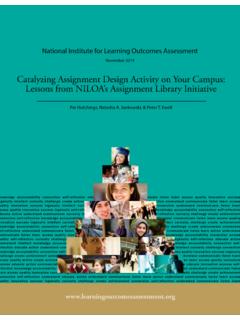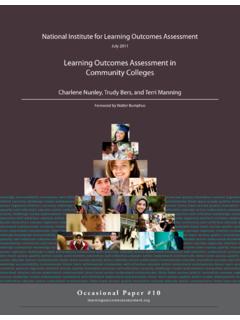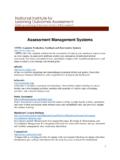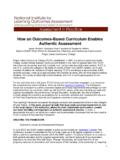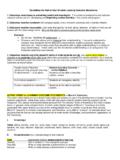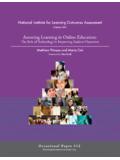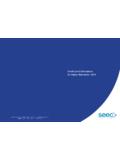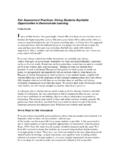Transcription of General Education at Delta College: Guided …
1 assessment in Practice General Education at Delta college : Guided Conversations toward relevant assessment Mike Faleski, Professor of Physics and Chair, Student learning assessment Committee Barb Handley-Miller, Professor of Communication and former Chair, General Education assessment Committee Delta college It seems to be universal that community colleges struggle to produce a relevant , sustainable, and assessable model for General Education . Like Sisyphus of Greek Mythology, we seem destined to continually roll that rock up the hill. Delta college is no exception! In an evaluation of our Systems Portfolio, the Higher learning Commission noted our General Education and program assessment models, but they also commented that the college lacked an over-arching Institutional assessment program that would capture a range of student learning outside the classroom, from athletics to cooperative learning and leadership programs.
2 Many of these areas of the college were assessing student learning , but it was not being reported in a systematic way institutionally. In response to the feedback, Delta created Institutional Student learning Outcomes (ISLO's). which were based on the college 's then-current General Education learning Outcomes (GELO's). These four ISLO's, noted in Table 1, could be applied to learning in many facets of the student experience both inside and outside of the classroom. For example, Delta 's Student Leadership Academy could assess students in each of these four outcomes through writing samples, presentations, and evaluations by faculty mentors. As we began to introduce these new institutional learning outcomes, multiple factors converged to show us that we needed another major revision of our GELO's and assessment model.
3 In this paper, we discuss the genesis of the ISLO's and how that helped to guide institutional discussions toward changing our GELO's and assessment model. A timeline of events is provided as well. Table 1. Delta college Institutional Student learning Outcomes (ISLO's). 1. Apply knowledge and skills 2. Think critically 3. Communicate effectively 4. Act responsibly The process of adopting these four ISLO's began by bringing together approximately fifty faculty members, academic managers, deans, and student affairs representatives starting in March of 2014. The faculty involved were members of General Education resource groups committed to assessing GELO's and improving student learning . At this large meeting, comparative research on ISLO's at other colleges was shared as context for what we were attempting to produce.
4 The goal of this meeting was to take a partial list of our GELO's along with some broader outcomes such as 1. Act responsibly in volunteer roles in the community from Student Services, and sort them into four to five umbrella groups using commonality among the outcomes. At this time, Delta 's GELO's had 12 major areas with a total of 38 outcomes to assess. Table 2 shows a partial list of those GELO's. Table 2. Portion of 2014 GELO's (6 of the 38 outcomes from 2 of the major Gen Ed areas). Reading Reading 1: Successfully read a passage of text to gather information. Reading 2: Successfully interpret the ways text (words and visual content) is organized and presented, specific to the disciplines. Reading 3: Analyze written information in ways appropriate to the disciplines.
5 Writing Writing 1: Employ writing to communicate ideas appropriate to the discipline. Writing 2: Employ conventional writing standards appropriate to the discipline. Writing 3: Employ writing to document sources appropriate to the discipline. Four smaller groups of ten people were formed to have diverse representation from those present. The task for each group was to produce its own set of broader outcomes to share with the entire group. The groups were each given tape, markers, a separate classroom in which to work, a facilitator to guide discussion, and approximately thirty outcomes on strips of paper to organize. Over the next forty-five minutes, the groups worked to synthesize these outcomes into more General categories. At the conclusion of the activity, everyone was brought together and the results of the work were shared.
6 Clear themes arose. Terms such as think, communicate, act, , and apply knowledge . appeared for virtually every group. After further analysis and wordsmithing to capture the spirit of what was generated that day. Consequently, a proposed model was developed and presentations were made to various employee committees and academic leadership within the college to receive feedback on the proposed model. By the fall of 2014, the ISLO's had been presented to and approved by the college 's Curriculum Council. We shared this procedure of synthesizing multiple outcomes to create higher order student competencies at the Valencia Conference in February 2015 to help other colleges having similar difficulties. The results were that each grouping of conference participants produced very similar sets to the General ISLO umbrellas developed at Delta college .
7 In our concluding slide of the presentation under Next Steps , we mentioned that another revision of the GELO's would be in order. The process of creating ISLO's helped us to create institutional awareness and need of the next necessary steps: to create fewer, more sustainable, and truly program-level GELO's. At the same time the ISLO's were being developed, several analyses were occurring with the General Education program. By January 2014, all resource groups had completed several years of work revising the GELO's. An audit of representative graduating students' transcripts was performed looking at how many GELO's were met. In addition, information about where outcomes were assessed was gathered for comparison. Considering that there were thirty-eight total GELO's, it was perhaps unsurprising there were certain gaps in the experiences of graduating students.
8 At the first meeting of the General Education Curriculum assessment Committee (GECAC) in the fall of 2014, the results from the graduates' transcripts were shared along with other analyses that provided explanations for the gaps. The members of the committee also commented on other features of the data, including that the number of exposures to certain outcomes (whether or not it 2. was assessed) varied tremendously. They recognized that the work in creating the ISLO's was applicable to creating GELO's since there were too many outcomes; many of which only a small percentage of graduates would fulfill. In the past, outcomes had been developed by resource groups for twelve different major areas ( Reading, Writing, Thinking ) and a holistic approach to General Education had not been used resulting in more course-based outcomes rather than program level outcomes.
9 The groundwork had been laid for the task of reducing our General Education model from the work done in generating the ISLO's. It was time to roll the boulder back up the hill. Beginning in January 2015, the task of breaking the existing GELO's into fewer, broader Gen Ed areas began. Again, a large number of employees (30 + faculty and Student Service reps). convened and were tasked to align the outcomes into no more than five total outcomes. Their work was informed by the comparative research we had completed for the ISLO's, and influenced by the Lumina Foundation Degree Qualifications Profile (DQP) and AAC&U General Education VALUE rubrics. There were substantive discussions on the history of Delta college General Education and what we wanted to achieve with new outcomes applying to our over 80 degree programs.
10 By the beginning of fall 2015, there was wide agreement from those that participated to move forward with five outcomes. In fall of 2015 and through the winter months of 2016, there were many lengthy discussions with that group of employees to develop the philosophy, number, and exact wording and definitions of the outcomes. While it was a messy democratic process at times to work toward consensus with that many faculty and staff involved, these interested people ultimately were the key to the success of this initiative. They showed up to many General Education meetings and championed the proposed model at both division meetings and all-faculty meetings. The biggest hurdle with all faculty was discussion over whether quantitative reasoning should be included in critical thinking or stated as a separate outcome.



